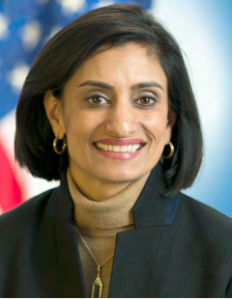The Centers for Medicare and Medicaid Services (CMS) says it will crack down on Medicaid fraud through a renewed analytical effort “to hold states accountable” following Office of Inspector General (OIG) findings in California, Kentucky and New York.

CMS Administrator Seema Verma
Thanks to a provision in the Affordable Care Act (ACA) that allows states to expand the ranks of those on Medicaid using the federal government’s dime, spending on Medicaid has risen from $456 billion in 2013 to $576 billion in 2016 (the ACA commenced operations in 2014).
In the announcement Tuesday by CMS Administrator Seema Verma, every state, plus Puerto Rico and D.C., will have to submit enhanced Medicaid data for the first time, data which the agency will scrutinize carefully.
The OIG report specifically asked CMS to take steps to mitigate Medicaid overpayments not being properly measured by revising the Payment Error Rate Measurement (PERM) methodology or by focusing additional audit resources on managed care.
Enforcement, however, still seems to be years off. A CMS statement clarified that “Current regulations will allow CMS to begin to issue potential disallowances to states based on Payment Error Rate Measurement program findings in 2022.”
DOJ Also Cracks Down
Attorney General Jeff Sessions and Department of Health and Human Services (HHS) Secretary Alex M. Azar III also announced the largest-ever health care fraud enforcement action involving 601 charged defendants across 58 federal districts, including 165 doctors, nurses and other licensed medical professionals, for their alleged participation in health care fraud schemes involving more than $2 billion in false billings.
Of those charged, 162 defendants, including 76 doctors, were charged for their roles in prescribing and distributing opioids and other dangerous narcotics. Thirty state Medicaid Fraud Control Units also participated in the arrests. In addition, HHS announced that from July 2017 to the present, it has excluded 2,700 individuals from participation in Medicare, Medicaid, and all other federal health care programs, which includes 587 providers excluded for conduct related to opioid diversion and abuse.
